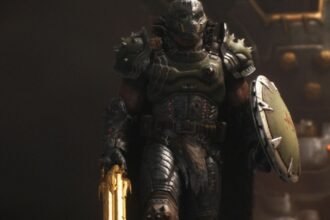The second season of The Last of Us kicked off with the episode titled "Future Days," revisiting the dramatic closing moments from season one. Joel, portrayed by Pedro Pascal, and Ellie, played by Bella Ramsey, find themselves on a hill overlooking the Jackson settlement, which they now call home. Ellie is skeptical of Joel’s story about raiders attacking the Firefly revolutionaries who sought a cure for the cordyceps fungus. When Ellie asks Joel to swear his account is true, he hesitates but then does so. Unlike the original, where the scene cuts to black on Ellie’s doubtful expression, this version shows Ellie descending the hill, leaving Joel in silence. This change signals some of the season’s challenges but is merely a precursor of more significant deviations.
In one of the first new scenes, Kaitlyn Dever’s Abby appears with a group of ex-Fireflies amid makeshift graves, watching giraffes roam through Salt Lake City ruins. This introduces Abby’s clear intentions early in the season, contrasting with the mystery maintained in The Last of Us Part II game. Abby’s quest for vengeance against Joel, motivated by his actions against the Fireflies, is laid bare when she places a pendant on one of the crosses signifying a personal loss.
The writing, primarily led by Craig Mazin with contributions from Neil Druckmann and Halley Gross in the final episodes, faces the challenge of translating the source material’s nuance into a more straightforward narrative. Abby and her group explicitly discuss their plan to confront Joel, diluting the ambiguity that marked their in-game counterparts. The shift towards a more expositional script affects character dynamics and leaves Mazin’s vision tethered to the game’s acclaimed storyline while making interpretative choices that deviate in a significant way from the original.
As the series leaps forward five years, we find a matured, tattooed Ellie in the Jackson settlement. Her sparring match with Jesse (Young Mazino) hints at her growing inclination toward violence, a thread tackled differently from the games. This portrayed violent streak is navigated through Ellie’s frustration with being shielded by the settlement’s men, reflecting a narrative tension between protective instincts and her desire for independence.
The depiction of Jackson as a flourishing community reflects elements from Part II, showcasing a society working together amidst a dystopian backdrop. Yet, Ellie remains unconvinced by the community’s ideals, echoing the disillusionment felt in the games, albeit with less subtlety. The adaptation diverges by amplifying Ellie’s youthful defiance, portrayed as less mature compared to her video game counterpart.
While Joel performs his daddiest duties repairing things in Jackson, his bond with Dina adds a fresh twist not present in Part II, offering a glimpse of his life beyond the survivor veneer. However, Joel’s efforts to connect with Ellie are plagued by their strained relationship post-Firefly incident, a conflict the show articulates more openly than the game does.
Further exploration into Jackson’s society is provided through Maria’s practical concerns about managing the town’s population, while Joel counters with a survivalist mindset. A new addition to the narrative is Joel attending therapy with Gail (Catherine O’Hara), offering another layer to his complicated persona post-Fireflies. This storyline balances on the edge of enriching Joel’s journey while risking overt exposition.
Diving into Ellie’s personal space, the show effectively captures her meticulously decorated room, a testament to her past adventures with Joel. A deviation from Joel and Ellie’s original interaction leads to an early introduction of Ellie and Dina’s relationship during a town dance scene. The romantic tension and ensuing confrontation at the dance remain faithful to iconic moments from the game, though placement and context have shifted.
As the episode concludes, the looming threat of a new infected wave outside Jackson signals another impending conflict. Ultimately, "Future Days" sets the stage for the season ahead, sparking questions about the necessity of its narrative choices and how well they serve the beloved source material. The Last of Us invites viewers to navigate its heightened emotional landscape every Sunday at 9 p.m. Eastern on Max.









